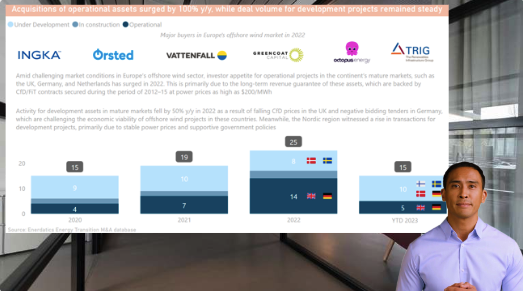Introduction
Renewable energy sources have gained significant traction in the quest for a sustainable and cleaner future. To further revolutionize the renewable energy sector, emerging technologies like blockchain are playing a crucial role. Blockchain technology offers a decentralized and transparent platform that has the potential to transform the way we generate, distribute, and consume renewable energy. This article explores the role of blockchain in renewable energy, its applications, advantages, challenges, case studies, future outlook, and concludes with frequently asked questions.
-tquba.jpg)
Understanding Blockchain Technology
Blockchain is a distributed ledger technology that enables secure and transparent transactions between multiple parties without the need for intermediaries. In the context of renewable energy, blockchain acts as a decentralized platform where participants can record, verify, and execute transactions related to energy generation, distribution, and consumption. The technology ensures transparency, immutability, and security of data, fostering trust and efficiency in the renewable energy ecosystem.
Blockchain Applications in Renewable Energy
Blockchain technology offers various applications that can revolutionize the renewable energy sector.
One such application is peer-to-peer energy trading, where blockchain enables direct transactions between energy producers and consumers. Smart contracts, built on the blockchain, facilitate the automatic execution of transactions, allowing individuals or businesses to buy and sell renewable energy in a decentralized manner.
Another application is grid management and flexibility. Blockchain can enable the integration of distributed energy resources, such as solar panels and wind turbines, into a smart grid. The technology allows for real-time monitoring, efficient energy balancing, and optimal utilization of renewable energy resources.
Advantages of Blockchain in Renewable Energy
- Transparency and Traceability
Blockchain technology provides transparency and traceability in the renewable energy sector. Every transaction recorded on the blockchain is visible to all participants, ensuring transparency in energy generation, distribution, and consumption. This transparency helps build trust among stakeholders and facilitates the verification of renewable energy claims.
- Enhanced Efficiency and Automation
Blockchain enables automation and streamlining of renewable energy transactions through smart contracts. Smart contracts execute predefined actions automatically when specified conditions are met, eliminating the need for intermediaries and reducing transactional friction. This automation improves efficiency and reduces costs in the renewable energy value chain.
- Peer-to-Peer Energy Trading
Blockchain facilitates peer-to-peer energy trading, allowing energy producers and consumers to interact directly without relying on centralized authorities. Through decentralized energy markets, individuals and businesses can sell excess renewable energy, reducing dependence on traditional energy providers and fostering local energy communities.
- Grid Management and Flexibility
Blockchain technology enhances grid management and flexibility by enabling the integration of diverse energy resources and optimizing their utilization. By leveraging real-time data on the blockchain, grid operators can efficiently balance energy supply and demand, mitigate grid congestion, and integrate intermittent renewable energy sources into the grid.
Challenges and Considerations
While blockchain offers immense potential in the renewable energy sector, there are several challenges and considerations that need to be addressed for widespread adoption.
- Scalability and Energy Consumption
Blockchain technology currently faces scalability limitations and high energy consumption due to the consensus mechanisms used in the validation process. As the number of transactions increases, the scalability of blockchain networks needs to be improved, while ensuring energy-efficient solutions.
- Regulatory and Legal Frameworks
The regulatory and legal frameworks surrounding blockchain in the renewable energy sector are still evolving. Policymakers need to develop appropriate regulations that encourage innovation while safeguarding consumer interests, ensuring privacy, and addressing potential challenges related to data protection and ownership.
- Interoperability and Standardization
Interoperability and standardization across different blockchain platforms and energy systems are essential for seamless integration and collaboration. Common protocols and frameworks need to be established to enable interoperability, allowing different blockchain networks and energy market participants to exchange information and execute transactions efficiently.
- Cybersecurity and Data Privacy
Blockchain technology requires robust cybersecurity measures to protect against potential threats. As renewable energy systems become increasingly connected and reliant on blockchain, ensuring the security and privacy of data becomes paramount. Robust cybersecurity protocols and privacy mechanisms should be implemented to mitigate risks associated with data breaches and unauthorized access.
Case Studies of Blockchain in Renewable Energy
Several case studies demonstrate the practical applications and successes of blockchain in the renewable energy sector. For example, a project in Brooklyn, New York, utilized blockchain technology to enable peer-to-peer energy trading among residents, resulting in cost savings and increased renewable energy consumption. Another project in Germany used blockchain to track and certify renewable energy attributes, providing transparency and trust in green energy claims.
Future Outlook and Potential
The future of blockchain in renewable energy looks promising. The technology has the potential to unlock new business models, promote renewable energy adoption, and accelerate the transition to a decentralized and sustainable energy ecosystem. As scalability, interoperability, and regulatory frameworks improve, blockchain is expected to play an increasingly vital role in revolutionizing renewable energy systems worldwide.
Conclusion
Blockchain technology has the potential to revolutionize the renewable energy sector by enhancing transparency, efficiency, and peer-to-peer transactions. With applications in peer-to-peer energy trading, grid management, and traceability, blockchain offers advantages that can accelerate the transition to a sustainable energy future. However, addressing challenges such as scalability, regulatory frameworks, interoperability, and cybersecurity is essential for unlocking the full potential of blockchain in renewable energy.

.jpeg)
